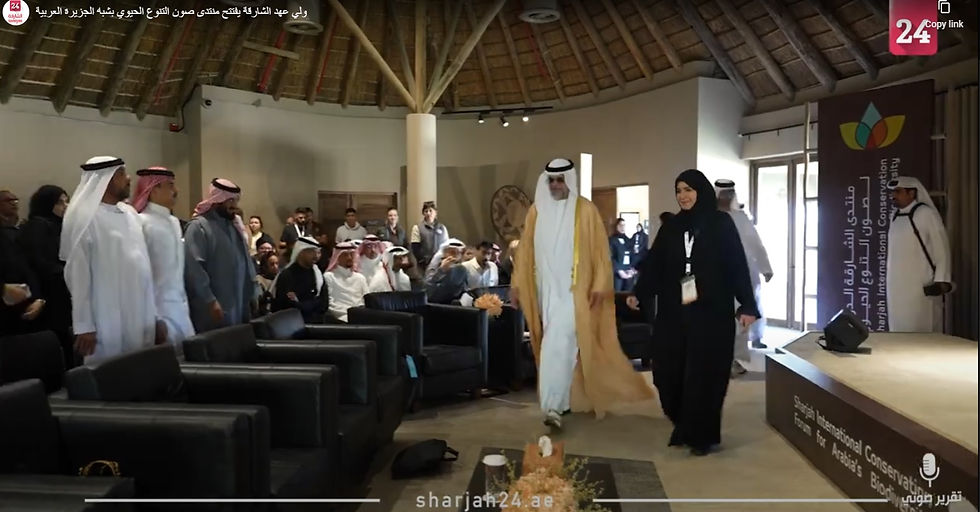His Highness the Crown Prince of Sharjah attends the 24th edition of the << Conservation of Biodiversity in the Arabian Peninsula Forum >>
- aldaghry
- Feb 6
- 3 min read

In the presence of His Highness Sheikh Sultan bin Mohammed bin Sultan Al Qasimi, Crown Prince and Deputy Ruler of Sharjah, the activities of the "Sharjah International Forum for the Conservation of Biodiversity in the Arabian Peninsula 4" were inaugurated, organized by the Environment and Protected Areas Authority, and will continue for four days, at Sharjah Safari in the city of Al Dhaid.

The opening ceremony began with a speech delivered by Ms. Hana Saif Al Suwaidi, Chairperson of the Environment and Protected Areas Authority, in which she stressed that the forum represents a prominent milestone in Sharjah's environmental journey, reflecting the emirate's commitment to dedicating research efforts to protect biodiversity and enhancing international cooperation to address environmental challenges.
Al Suwaidi pointed out that this year's forum focuses on the final and decisive re-evaluation of the Arabian reptiles that were subjected to the initial evaluation in 2012, with the scope of the study being expanded to include all types of amphibians in the Arabian Peninsula. The results of these evaluations revealed a significant increase in the number of endemic species, rising from 89 species in 2012 to 141 species at present, reflecting the development of scientific knowledge about the unique environmental diversity in the region and the need to enhance protection efforts for these species.

Mr. Philip Seddon, a member of the scientific committee of the forum, provided a brief overview of the topics of the forum in its current version, praising the efforts of those in charge of the forum from its launch until its twenty-fourth version and its most prominent recommendations that have enhanced many areas such as: management of natural reserves, regional bio-planning, eco-tourism and the release of organisms into their natural environments.

Dr. Craig Hilton Taylor, Head of the Red List Unit at the International Union for Conservation of Nature, gave a comprehensive overview of the regional Red List of Reptiles and Amphibians, explaining the most prominent challenges and conservation efforts in this field, in addition to the goals that the Union seeks to achieve to preserve nature.
Dr. Hani Al Shaer, Regional Director of the International Union for Conservation of Nature, gave an introductory presentation on the IUCN Green List, its most prominent characteristics, standards, actual value, and the conditions that allow entities to enter it, in addition to presenting many examples in the world and the Arab world of reserves that are on the Green List and their pioneering role in nature conservation.

His Highness the Crown Prince of Sharjah received the certificate of Sir Bu Nair Island Reserve’s accession to the IUCN Green List, which confirms the role of the Emirate of Sharjah in promoting protected and preserved areas and their effective management, applying best practices and standards, in addition to adopting international indicators for protected areas that achieve the desired outcomes of the nature conservation process.
The Sharjah International Forum for the Conservation of Biodiversity in the Arabian Peninsula will witness several discussion sessions on regional red list assessments, marine strandings, and the role of regional stranding networks in monitoring and protecting marine life, in addition to empowering the rising generations of researchers and environmental specialists through practical sessions on dealing with dead whales and postmortem dissection.

The 24th edition of the forum will be held with the participation of more than 130 international experts and researchers specializing in environmental sciences and biodiversity. It will continue for four days, addressing the most prominent environmental issues, in a scientific step that reflects the increasing development in understanding ecosystems and enhancing strategies for preserving endangered species.



Comments